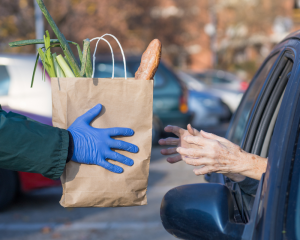
We often focus on the numbers when reviewing how the community has dealt with the COVID-19 pandemic – numbers tested and vaccinated among our citizens, as well as dollars awarded in grant funds.
While Talbot County distributed a total of $3,243,899 in CARES funding in individual assistance, small business assistance, and emergency operations, the personal stories of perseverance and reinvention during COVID-19 are the most compelling. From distributing food and helping families navigate childcare, to assisting local businesses and nonprofits so that they could stay afloat, and in some cases, thrive, Talbot County government stretched its arms to reach out in historic ways to assist its residents.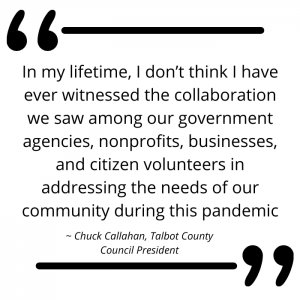
“In my lifetime, I don’t think I have ever witnessed the collaboration we saw among our government agencies, nonprofits, businesses, and citizen volunteers in addressing the needs of our community during this pandemic,” comments Talbot County Council President Chuck Callahan.
It Takes a Village
In the area of individual assistance, funds were disbursed through the Talbot County Finance Office, the Talbot County Department of Social Services, the Neighborhood Service Center, St. Vincent de Paul Society, Chesapeake Multicultural Resource Center, with support from the Talbot County Emergency Operations Center.
While individuals in Talbot County received help with their rent, mortgages, utilities, car payments or repairs, and licensed childcare needed for virtual school attendance, the distribution of food to the county’s residents was perhaps the most impressive accomplishment of all. Between the Maryland Food Bank and county food partners, over two million pounds of food was distributed during 2020 to Talbot County residents. Talbot County’s food pantry network also helped distribute information about resources, testing, and vaccines.
Jan Willis, coordinator of the Local Care Team for Talbot County, managed the Emergency Operations Committee Feeding Task Force. “Talbot County’s network of established food pantries, churches, and the Maryland Food Bank worked in unfailing partnership with the Talbot Emergency Operations Center (EOC) to make sure food was available throughout the county,” she says.
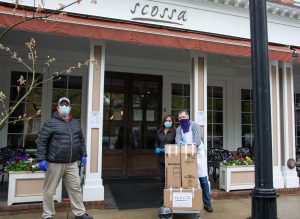
When restaurants had to close early in the pandemic many, like Scossa, distributed free food.
To date, more than 500 volunteers have stepped in to support the distribution of food throughout the county whether providing food delivery to our homebound elderly or providing transportation and food resources to families under quarantine.
“The tremendous amount of caring and kindness displayed by businesses donating goods and services, by community groups and churches stepping in to fill gaps and needs, and by Talbot County citizens of all ages volunteering countless hours to help their neighbors was and is breathtaking,” she continues.
“The power of community is amazing.”

Above, Naomi Thomas of Scott’s United Methodist Church in Trappe who has been coordinating food distribution at the church for more than 15 years. Thomas helped Talbot County’s Emergency Operation Center create a mobile food distribution model that could be replicated around Talbot County.
Volunteers Were Key
Naomi Thomas who has been coordinating food distribution at Scott’s United Methodist Church in Trappe for more than 15 years helped Talbot County’s Emergency Operation Committee create a mobile food distribution model that could be replicated around Talbot County. During COVID, the pantry is distributing 120 boxes monthly to mainly African American residents over the age of 65 and single-family homes of essential workers in and around the Trappe area.
“The Talbot EOC helped us connect to new volunteers, mainly from the Trappe area, which has really helped our manpower,” Thomas explains. “We even have a volunteer now who is a relative of President Eisenhower helping us out! The meeting of the people, helping those in need and knowing I am making a difference has been the most rewarding things about this work. It also provides a reason to keep our churches going – knowing there is a need to serve in our community.”
Meeting the Challenges of Working Parents
For Cristy Morrell, Executive Director, Critchlow Adkins Children’s Centers, working with Cassandra Vanhooser, director of Talbot County Department of Economic Development and Tourism, helped her organization address the challenges parents with school-age children were facing with unexpected childcare costs related to virtual learning through the CARES funding.
 “This was cost-prohibitive for many families, especially for those who had more than one child. Before the CARES grant, many families were forced to choose whether to work or stay home and care for their children,” Morrell says.
“This was cost-prohibitive for many families, especially for those who had more than one child. Before the CARES grant, many families were forced to choose whether to work or stay home and care for their children,” Morrell says.
“Balancing family, work, and school is difficult in and of itself, but balancing all of that during COVID was and is extremely challenging. Funding from this grant eased some of these challenges for our families. Last fall, we expanded our school-age before- and after-school childcare programs to all-day programs to better assist families with the Talbot County Public School (TCPS) system’s virtual learning.”
Help for Small Businesses and Nonprofits
Talbot County’s business and nonprofit community has also been affected deeply by the pandemic. To assist businesses and nonprofits in Talbot County impacted by COVID-19 in 2020, a grants task force made up of Talbot County’s Economic Development Commission members set guidelines and voted on important issues related to guidance and assistance for local businesses and tourism venues.
 The task force included Walter Chase, Ron Engle, Sandi Pepe, Jean Weisman, and Jackie Wilson from the EDC, plus Rich Loeffler of the Small Business Development Center. Talbot County received applications from 171 businesses and awarded a total of $1.45 million in grants to 154 small businesses in Talbot County.
The task force included Walter Chase, Ron Engle, Sandi Pepe, Jean Weisman, and Jackie Wilson from the EDC, plus Rich Loeffler of the Small Business Development Center. Talbot County received applications from 171 businesses and awarded a total of $1.45 million in grants to 154 small businesses in Talbot County.
Grants were awarded to businesses in the following towns for the amounts listed: Easton ($947,894), St. Michaels ($264,719), Oxford ($80,000), Cordova ($40,000), and Trappe ($33,387). The top-funded industries included: Eating and Drinking ($396,000), Clothing and Misc. Retail ($224,374), Amusement and Recreation ($137,100), Personal and Health Services ($130,061), Lodging ($123,400), and Beauty Shops ($91,505).
“Emergency funding from Talbot County, State, and Federal sources made it possible for the Avalon Foundation to retain its entire workforce. This gave the Foundation the capacity to adapt its programming in innovative ways and to support community needs in ways that we would have never imagined,” says Al Bond, president and CEO of the Avalon Foundation, Inc.
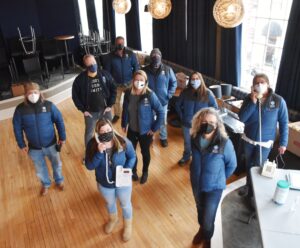
The Avalon Foundation worked with the Talbot County Health Department to create a call center to address information about the pandemic.
Last year, the Avalon Foundation was able to organize a Farmers Market, celebrate the 4th of July, produce Plein Air Easton and build the Stoltz Pavilion – a brand new music venue. The Foundation also produced 30 public service announcements and other videos for Emergency Management Services, provided video services to local government which made it possible for them to adhere to the Open Meetings Act, organized Feed the Front (an effort to harness local restaurants to feed front line workers), operated a vaccination hotline for the Talbot County Health Department and adapted the Foundation’s Multicultural Festival to deliver vaccines to some of the hardest to reach populations in the community.
While Bond acknowledges that each of these accomplishments was important on its own, emergency funding put the Foundation in a position to resume its regular programming quickly when restrictions are lifted which will have a positive impact on the community that they serve for years to come.
 Small business owner Katherine Binder Forloney, owner of Eastern Shore Acupuncture in Easton, says that the CARES funds helped her avoid costly loans that would have had a long-term impact on her business’s recovery.
Small business owner Katherine Binder Forloney, owner of Eastern Shore Acupuncture in Easton, says that the CARES funds helped her avoid costly loans that would have had a long-term impact on her business’s recovery.
“Cassandra was amazing walking me through the CARES and PPP applications. She fought for every small business in Talbot County. We are a service-based industry so when we got shut down, that was a huge loss of income. When we were told we could come back, there were so many new expenses needed, such as personal protective equipment and cleaning supplies,” Binder says.
“CARES was a lifeline to me. I feel so grateful and fortunate to have had this as a resource during such an overwhelming time,” she continues. “Continuity of care was interrupted for my clients. They experienced loss as they lost ground with their health when they couldn’t get my services. To manage that loss and to incur the additional expenses would have been an incredible burden on my business.”
Restaurants Rallied
Talbot County’s restaurants were not immune to the losses during COVID-19, but with CARES funding and additional funds from the State and Federal government for restaurants, many local restaurants are recovering and have found new creative ways of operating to meet the needs of their patrons.
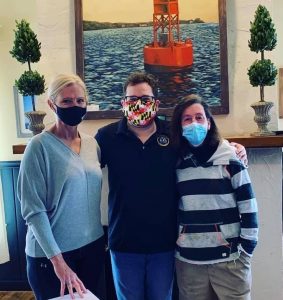
Pictured left to right are Wendy Palmer, co-owner of Latitude 38, Oxford Town Commissioner Jimmy Jaramillo, and Gretchen Gordon, co-owner of Latitude 38, during the restaurant’s recent 30th Anniversary celebration.
Gretchen Gordon and Wendy Palmer of Latitude 38 in Oxford said that they never had to shut down during the pandemic because they reimagined their takeout business, initially offering delivery and then curbside pickup for local patrons. The restaurant used CARES funds to enhance an underused outside courtyard to bring in patrons once restaurants were allowed to reopen last year.
“We used the funds to purchase new tables, chairs, umbrellas, and commercial heaters and fans to transform the courtyard area,” Gordon explains. “We even got our fishpond working again. The space now provides a comfortable and safe dining option for our patrons. We have such a loyal clientele – they really supported us and that has been humbling.”
Gordon said that she used PPP loans to pay her staff who were at home during the shutdown and that the funding enabled her to keep all of her staff once the restaurant reopened.
When the State of Maryland allocated money from the Rainy Day Fund to provide additional grants to assist businesses in the hospitality industry through the Restaurant Relief Fund Grant Fund, Talbot County awarded $531,350 to 81 restaurants in Round 1; and $318,810 to 87 restaurants in Round 2. Talbot County awarded the Hotel/Motel Grant of $534,480 to eligible hotels and bed & breakfast establishments and the Hometown Tourism Marketing Grant of $47,982 for marketing and advertising for Talbot County.
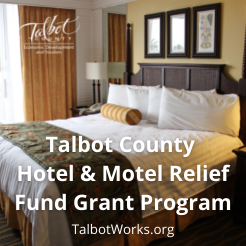 Grant Programs Continue to Roll Out
Grant Programs Continue to Roll Out
According to Vanhooser, thanks to the RELIEF Act of 2021, several new grant programs funded by the State of Maryland are being rolled out this spring. These programs include the Small Business COVID RELIEF Grant Program, the Small, Minority and Women-Owned Business Administration COVID RELIEF Program, the Restaurant and Caterers COVID RELIEF Grant Program, the Lodging and Accommodations COVID RELIEF Grant Program, the Online Sales and Telework Assistance COVID RELIEF Grant Program, and the MARYLAND RECOVERY NOW Nonprofit Grant.
In addition to the CARES funds distributed to individuals, businesses, and nonprofits, Emergency Operations CARES funds were distributed to the following agencies in 2020 to assist their efforts during the COVID-19 public health emergency: County Emergency Operations ($503,225), County Volunteer Fire Departments ($186,939), Talbot County Public Schools ($44,203), and Talbot County municipalities ($43,617). FEMA 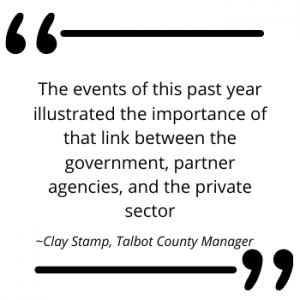 funding of $168,204 supported County Emergency Operations.
funding of $168,204 supported County Emergency Operations.
“The support provided by the Emergency Operations Center throughout the pandemic reflects just how integrated the Emergency Management system is in monitoring and responding to crisis events in the community. The events of this past year illustrated the importance of that link between the government, partner agencies, and the private sector,” comments Clay Stamp, Talbot County Manager.
For further information about new grant programs funded by the State of Maryland and administered by the Talbot County Department of Economic Development and Tourism, visit talbotworks.org.